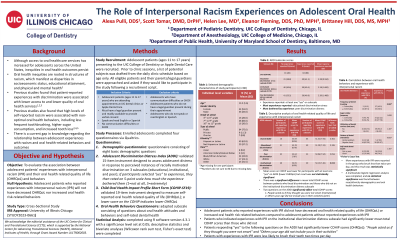Other
305 - The Role of Interpersonal Racism Experiences on Adolescent Oral Health


Alexa P. Pulli, DDS (she/her/hers)
Pediatric Dental Resident
University of Illinois at Chicago, Chicago IL
University of Illinois at Chicago
Chicago, Illinois, United States- EF
Eleanor Fleming, PhD, DDS, MPH, FICD
University of Maryland School of Dentistry
- HL
Helen Lee, MD
University of Illinois Chicago College of Medicine
- ST
Scott Tomar, DMD, DrPH
University of Illinois Chicago College of Dentistry

Brittaney J. Hill, DDS, MS, MPH
Clinical Assistant Professor and Program Director, Department of Pediatric Dentistry
University of Illinois at Chicago
University of Illinois at Chicago
Chicago, Illinois, United States
Presenting Author(s)
Co-Author(s)
Program Director(s)
Purpose: The purpose of this study was to evaluate the association between adolescent patients’ experiences with interpersonal racism (IPR) and their oral health-related quality of life (OHRQoL) and behaviors. We hypothesize that adolescent patients who report experiences with interpersonal racism will have decreased OHRQoL and increased oral health risk-related behaviors.
Methods: Adolescent patients ages 11 to 17 years were recruited at UIC COD pediatric dental clinics and Apple Dental Care. Participants completed a demographic questionnaire, the adolescent discrimination distress index (ADDI), the child oral health impact profile short form (COHIP-SF19), and an oral health behaviors questionnaire via Qualtrics. Descriptive statistics and bivariate analysis were conducted via R software with a p-value of < 0.05 set for significance.
Results: Eighty adolescents with a mean age of 13.2 years (SD 1.6) completed the questionnaires. Participants were 33% Black, 24% White and 32% “Other” race. Forty-nine participants (63%) identified as Hispanic or Latino. Sixty-five adolescents (81%) reported at least one experience with discrimination on the ADDI, with the most experiences reported on the Education Discrimination Stress subscale. There was a statistically significant difference in mean total COHIP scores between patients who reported an experience with IPR on the institutional discrimination distress subscale and those who did not (P=.014). More experiences with IPR were reported in the group who brushed less than twice a day (P=.023).
Conclusions: Patients with experiences with IPR did not have a lower OHRQoL and did not have increased oral health risk-related behaviors compared to those who did not have experiences with IPR. More research is needed to further evaluate the relationship between adolescent experiences with discrimination and specific oral health markers.
Identify Supporting Agency and Grant Number:

.jpg)